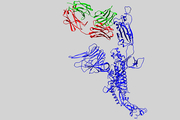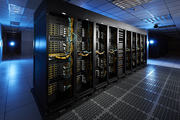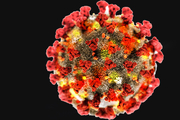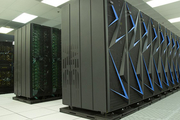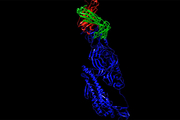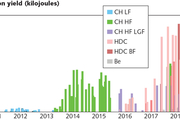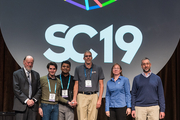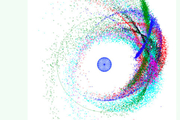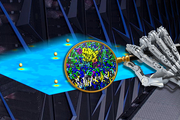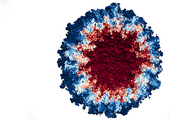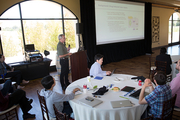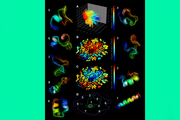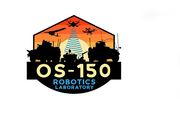Did you know we have a monthly newsletter? View past volumes and subscribe.
Interpretable AI in healthcare (PODCAST)
May 17, 2020 -
LLNL's Jay Thiagarajan joins the Data Skeptic podcast to discuss his recent paper "Calibrating Healthcare AI: Towards Reliable and Interpretable Deep Predictive Models." The episode runs 35:50. Listen at Data Skeptic.
The incorporation of machine learning into scientific simulations at LLNL (VIDEO)
May 5, 2020 -
In this video from the Stanford HPC Conference, Katie Lewis presents "The Incorporation of Machine Learning into Scientific Simulations at Lawrence Livermore National Laboratory." Read more and watch the video at insideHPC.
New ML platform generates novel COVID-19 antibody sequences for experimental testing
May 1, 2020 -
LLNL researchers have identified an initial set of therapeutic antibody sequences, designed in a few weeks using machine learning and supercomputing, aimed at binding and neutralizing SARS-CoV-2, the virus that causes COVID-19. The research team is performing experimental testing on the chosen antibody designs. Read more at LLNL News.
Upgrades for LLNL supercomputer from AMD, Penguin Computing aid COVID-19 research
April 21, 2020 -
Under a new agreement, AMD will supply upgraded graphics accelerators for LLNL’s Corona supercomputing cluster, expected to nearly double the system’s peak compute power. The system will be used by scientists through the public/private COVID-19 HPC Consortium, and by LLNL researchers, who are working on discovering potential antibodies and anti-viral compounds for SARS-CoV-2, the virus that...
Local Women in Data Science conference showcases Lab research
April 3, 2020 -
For the third consecutive year, LLNL hosted a Women in Data Science (WiDS) regional event on March 2. The event drew dozens of attendees from LLNL, Sandia National Laboratories, local universities, and Bay Area commercial companies.
Livermore was one of over 200 regional events in 60 countries coordinated with the main WiDS conference at Stanford University. According to the WiDS website...
LLNL creates web resources to aid in fight against COVID-19
March 30, 2020 -
LLNL is fully committed to helping protect the U.S. from COVID-19 and to speed the recovery of those affected. As a world-class research institute, we have considerable infrastructure, unique research capabilities and a dedicated team of scientists and engineers supporting the fight against the COVID-19 pandemic. Our current COVID-19 research and response activities are focused on four broad...
New partnership to unleash U.S. supercomputing resources in the fight against COVID-19
March 26, 2020 -
The White House announced the launch of the COVID-19 High Performance Computing Consortium to provide COVID-19 researchers worldwide with access to the world’s most powerful high performance computing resources that can significantly advance the pace of scientific discovery in the fight to stop the virus. Read more at LLNL News.
Lab antibody, anti-viral research aids COVID-19 response
March 26, 2020 -
LLNL scientists are contributing to the global fight against COVID-19 by combining artificial intelligence/machine learning, bioinformatics and supercomputing to help discover candidates for new antibodies and pharmaceutical drugs to combat the disease. Armed with the virus’ predicted 3D structure and a few antibodies known to bind and neutralize SARS, an LLNL team led by Daniel Faissol and...
Deep learning may provide solution for efficient charging, driving of autonomous electric vehicles
Feb. 4, 2020 -
LLNL computer scientists and software engineers have developed a deep learning-based strategy to maximize electric vehicle (EV) ride-sharing services while reducing carbon emissions and the impact to the electrical grid, emphasizing autonomous EVs capable of offering 24-hour service. Read more at LLNL News.
Can machine learning improve computer models enough to ignite internal confinement fusion?
Jan. 28, 2020 -
Laser-fusion researchers have turned to machine-learning techniques to seek the combinations of laser pulse characteristics and target design needed to optimize target implosions for inertial confinement fusion. Machine learning has tripled the fusion yield of the simpler direct-drive approach being studied with the OMEGA laser at the University of Rochester. In principle, the Rochester...
LLNL-led team awarded Best Paper at SC19 for modeling cancer-causing protein interactions
Nov. 22, 2019 -
A panel of judges at the International Conference for High Performance Computing, Networking, Storage and Analysis (SC19) on Thursday awarded a multi-institutional team led by Lawrence Livermore National Laboratory computer scientists with the conference’s Best Paper award. The paper, entitled “Massively Parallel Infrastructure for Adaptive Multiscale Simulations: Modeling RAS Initiation...
Department of Energy researchers share data management strategies at first-ever “Data Day”
Nov. 11, 2019 -
It’s become something of a mantra of the digital age: Data is the new currency. Especially in science, where it’s hard to find a single project that doesn’t involve generating or consuming massive amounts of data.
In light of the growing awareness of the critical importance of data management across the Department of Energy complex, more than 100 researchers from DOE national laboratories...
Big data illuminates the physical sciences
Nov. 6, 2019 -
Livermore teams are applying innovative data analysis and interpretation techniques to advance fundamental science research. This article describes projects in astrophysics and materials science. Read more at Science & Technology Review.
Lab leads effort to model proteins tied to cancer
Oct. 31, 2019 -
Computational scientists, biophysicists and statisticians from LLNL and Los Alamos National Laboratory(LANL) are leading a massive multi-institutional collaboration that has developed a machine learning-based simulation for next-generation supercomputers capable of modeling protein interactions and mutations that play a role in many forms of cancer. Read more at LLNL News.
Successful simulation and visualization coupling proves the power of Sierra
Oct. 22, 2019 -
As the first National Nuclear Security Administration (NNSA) production supercomputer backed by GPU- (graphics processing unit) accelerated architecture, Sierra’s acquisition required a fundamental shift in how scientists at Lawrence Livermore National Laboratory (LLNL) program their codes to take advantage of the GPUs.
The majority of Sierra’s computational power—95 percent of its 125...
Cindy Gonzales forges a new career in data science
Sept. 25, 2019 -
Through LLNL’s Data Science Immersion Program, Gonzales is now among the Lab’s newest data scientists. For two and a half years, she juggled a demanding workload—coordinating Computing’s Scholar Program, interning with data scientists, learning from mentors, supporting LLNL’s Data Science Institute, and attending college part time—while also having her first child. Read more at LLNL Computing...
Collaboration drives data science workshop
Sept. 12, 2019 -
Lawrence Livermore National Laboratory’s (LLNL’s) Data Science Institute (DSI) hosted its second annual workshop on July 23–24, 2019. Co-sponsored by the University of California (UC) system, the event drew more than 200 participants to Garré Winery in Livermore. A common theme ran throughout both days: Collaboration is always welcome.
Indeed, feedback from last year’s workshop inspired a...
Energy Department, Weill Foundation sign MOU to advance AI for biomedicine, health research
Aug. 27, 2019 -
U.S. Secretary of Energy Rick Perry and Sandy Weill, founder of the Weill Family Foundation, signed a memorandum of understanding (MOU) to formally initiate a public-private partnership for artificial intelligence (AI), neurological disorders and related subjects. The MOU will foster collaboration to demonstrate AI-based research breakthroughs that span from basic science focused on a better...
CANDLE illuminates new pathways in fight against cancer
Aug. 16, 2019 -
As part of the Department of Energy’s role in the fight against cancer, scientists are building tools that use supercomputers to solve problems in entirely new ways. Cancer research provides a complex deep learning challenge that enables DOE to develop new supercomputing capabilities that will, in turn, help scientists address challenges in national security and science. The CANcer...
New open-air facility will be testing ground for autonomous drones, vehicles and robots
July 25, 2019 -
LLNL’s new OS-150 Robotics Laboratory is an outdoor, 8,000 square-foot enclosure that will serve as a proving ground for the autonomous drones, vehicles and robots of the future. Informally known as the "drone pen," the 50-foot-tall rectangular enclosure, located directly across from one of the Lab’s main engineering buildings, is allowing operators to pilot their drones safely and...



